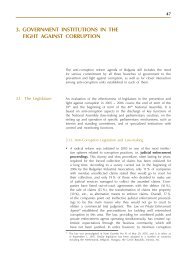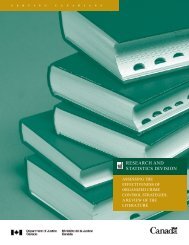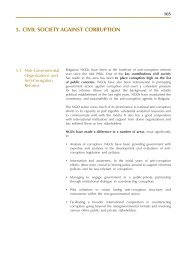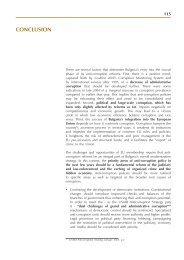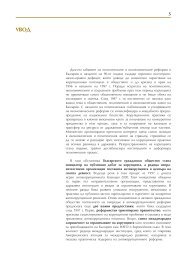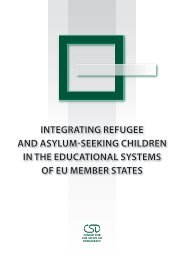National Threat Assessment 2008. Organised Crime - Politie
National Threat Assessment 2008. Organised Crime - Politie
National Threat Assessment 2008. Organised Crime - Politie
You also want an ePaper? Increase the reach of your titles
YUMPU automatically turns print PDFs into web optimized ePapers that Google loves.
Hazardous substances are listed on the orange list in the aforementioned EU<br />
Waste Shipment Regulation. Whenever the shipment of hazardous substances is<br />
allowed, a written notice must be issued and permission must be granted prior<br />
to the shipment. Hazardous substances may only be shipped if they are intended<br />
for a useful application and, even if they are, only to certain (usually wealthy)<br />
countries. A useful application assumes that secondary raw materials have been<br />
obtained by recycling, re-use, recovery or other actions. All other cases are<br />
considered to be disposal (dumping of waste materials, for example).<br />
Non-hazardous substances are listed on the green list. When shipping nonhazardous<br />
substances it is sufficient to send certain accompanying information<br />
with the transport. Non-hazardous substances intended for a useful application<br />
can be shipped to any country (provided that the accompanying information is<br />
present). Shipment of non-hazardous substances for disposal is prohibited, unless<br />
the substances are exported to countries to which the OECD Decision applies,<br />
countries that are named as ‘third-party countries’ in the Basel Convention<br />
or countries that have entered into a bilateral agreement with the EU.<br />
The shipment of waste materials requires that a contract be drawn up between<br />
the person having the waste shipped (or the person carrying out the shipment)<br />
and the person receiving the waste. This contract must be accompanied by<br />
financial guarantees if the waste in question requires a notification. As part<br />
of the notification procedure, the person issuing the notification must send a<br />
notification to the competent authorities in the country from which the waste<br />
is to be shipped, who must then send on this notification to the competent<br />
authorities in the destination and transit countries. The competent authorities<br />
must grant permission within a period of 30 days (with or without conditions) or<br />
make their objections known. If a shipment cannot be completed in the planned<br />
manner (including the useful application of the waste materials or their disposal),<br />
the person issuing the notification must take back the waste materials, in<br />
principle at his own expense.<br />
In the Netherlands, the Inspectorate of the Ministry of Housing, Spatial<br />
Planning and the Environment is responsible for supervising compliance with and<br />
the administrative enforcement of the EU Regulation on the Shipment of Waste.<br />
An inspection can be performed:<br />
• at the premises of the producer of the waste materials, the holder<br />
or the issuer of the notification;<br />
• at the premises of the recipient of the waste materials;<br />
• during the shipment itself;<br />
• and – in consultation with the enforcement agency in the destination<br />
country – at the premises of the processing company.<br />
chapter 3 – Fraud and money laundering<br />
121



